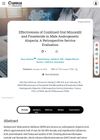
Low-dose spironolactone can be effective for treating hair loss in women.

Combined oral minoxidil and finasteride significantly improve hair density in men with male pattern baldness.
 January 2025 in “Journal of the American Academy of Dermatology”
January 2025 in “Journal of the American Academy of Dermatology” Combining oral minoxidil and bicalutamide may help improve hair growth in adolescent girls.
[object Object]  April 2024 in “JAMA dermatology”
April 2024 in “JAMA dermatology” Oral minoxidil is as effective as topical minoxidil for male hair loss but has more side effects like excessive hair growth and headaches.

Most dermatologists use and find oral minoxidil effective and tolerable for hair loss treatment.
 July 2023 in “Archives of Dermatological Research”
July 2023 in “Archives of Dermatological Research” Minoxidil may help with hair loss caused by cancer treatments.
3 citations,
March 2022 in “Archives of Dermatological Research”  November 2023 in “Skin appendage disorders”
November 2023 in “Skin appendage disorders” Public interest in oral minoxidil for hair loss increased after a New York Times article.
[object Object]  1 citations,
May 2022 in “Revista Contemporânea”
1 citations,
May 2022 in “Revista Contemporânea” Combining two treatments for hair loss works better than using just one.
July 2022 in “British Journal of Dermatology” April 2022 in “Actas Dermo-Sifiliográficas”  43 citations,
November 2019 in “American Journal of Clinical Dermatology”
43 citations,
November 2019 in “American Journal of Clinical Dermatology” FAGA diagnosis uses blood tests and trichoscopy, with treatments like topical minoxidil, oral anti-androgens, and hormone-modulating drugs.
 3 citations,
January 2020 in “Skin appendage disorders”
3 citations,
January 2020 in “Skin appendage disorders” In Spain, dermatologists most commonly prescribe topical minoxidil and oral finasteride for male hair loss, and topical minoxidil and oral contraceptives for female hair loss. The use of oral dutasteride and oral minoxidil has significantly increased over the past three years.

Oral minoxidil is as effective and safe as topical minoxidil for treating female pattern hair loss.
January 2023 in “Revista Eletrônica Acervo Saúde” 
Mesotherapy is a promising alternative to minoxidil for hair loss with mild side effects.
 53 citations,
February 2020 in “Expert Opinion on Pharmacotherapy”
53 citations,
February 2020 in “Expert Opinion on Pharmacotherapy” Finasteride and minoxidil work best together for hair loss.
 April 2021 in “Advances in Cosmetic Surgery”
April 2021 in “Advances in Cosmetic Surgery” Hair restoration can be achieved through non-surgical treatments like minoxidil, antiandrogens, phototherapy, and PRP procedures, or through surgical methods like hair transplantation. Continued treatment is needed to maintain results, and full results are visible after 12-18 months.
 7 citations,
March 2017 in “Actas Dermo-Sifiliográficas”
7 citations,
March 2017 in “Actas Dermo-Sifiliográficas” Several new treatments for different types of hair loss show promise in improving patient quality of life.
 November 2024 in “Journal of Drugs in Dermatology”
November 2024 in “Journal of Drugs in Dermatology” Injectable minoxidil is a promising, effective treatment for hair loss.
 23 citations,
October 2018 in “Expert Opinion on Drug Safety”
23 citations,
October 2018 in “Expert Opinion on Drug Safety” Consider benefits and risks of new alopecia treatments for safety.
March 2023 in “Advances in Clinical and Experimental Medicine” Oral and topical finasteride are effective and safe for treating female hair loss.
March 2023 in “Clinical, Cosmetic and Investigational Dermatology” Spironolactone can effectively treat hair loss with manageable side effects.
1 citations,
June 2022 in “Pharmaceutics” Minoxidil's absorption is too variable for it to be a reliable reference drug.
 February 2024 in “Scientific Reports”
February 2024 in “Scientific Reports” Topical minoxidil and dietary supplements improved hair regrowth in children with hair loss from chemotherapy.

The review found that PRP is the most effective treatment for hair loss with few side effects.
 July 2023 in “JAAD International”
July 2023 in “JAAD International” Two drugs, finasteride and minoxidil, are approved for hair loss treatment, but new therapies are being developed.
 June 2024 in “Journal of Education, Health and Sport”
June 2024 in “Journal of Education, Health and Sport” Androgenetic alopecia can be treated with minoxidil and finasteride, requiring long-term use and patient cooperation.
 4 citations,
March 2023 in “Current Oncology”
4 citations,
March 2023 in “Current Oncology” Scalp cooling is the only FDA-approved method to prevent hair loss from chemotherapy, but other treatments like minoxidil and PRP are being tested.
January 2025 in “Anais Brasileiros de Dermatologia” Male pattern baldness worsens with age and can be treated with medications like minoxidil and finasteride, but side effects and personalized care are important.






















